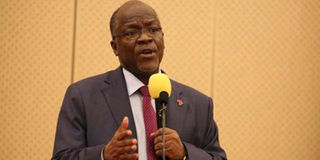Tanzania rises in latest graft survey

President John Magufuli
What you need to know:
In the CPI 2017, released on Wednesday by the Transparency International, Tanzania was given a performance score of 36, being an improvement from the score of 32 in the CPI 2016
Dar es Salaam. Tanzania has been ranked slightly higher in the Corruption Perceptions Index 2017 (CPI 2017) vindicating President John Magufuli’s zealous fight against graft.
In the CPI 2017, released on Wednesday by the Transparency International, Tanzania was given a performance score of 36, being an improvement from the score of 32 in the CPI 2016.
Globally Tanzania was ranked at position 103, sharing the same slot with Bahrain, Mongolia and Côte d´Ivoire among 180 countries that were surveyed. In 2016 Tanzania was ranked at position 116 together with Mali, Pakistan and Togo among the 176 countries surveyed.
The CPI 2017 score of 36 was the highest that Tanzania has ever achieved in the last six years.
The country had a score of 35 in 2012 before falling to 33 in 2013, 31 in 2014, 30 in 2015 and 32 in 2016.
The CPI surveys rank countries and territories by their perceived levels of public sector corruption according to experts and businesspeople. The CPI uses a scale of 0 to 100, where 0 is highly corrupt and 100 is very clean.
In the CPI 2017 New Zealand was deemed the least corrupt country in the world with a score of 89 followed by Denmark (88), Finland (85), Norway (85) and Switzerland (85).
The most corrupt country in the world, with scores in brackets, was Somalia (9) followed by South Sudan (12), Syria (14), and Afghanistan (15) and Yemen (16).
In East Africa, Tanzania was deemed the second least corrupt country after Rwanda while in sub-Saharan Africa Tanzania was ranked at position 17 with Botswana being the least corrupt country in the region.
In East Africa Kenya was ranked as the third least corrupt country followed by Uganda, Burundi and South Sudan.
Analysis of the CPI 2017 results indicates that countries with the least protection for press and non-governmental organisations (NGOs) also tended to have the worst rates of corruption.
The Transparency International team that conducted the survey said their first-hand experience working in more than 100 countries around the world showed that activists and media were vital to combatting corruption.
“As such, Transparency International calls on the governments and businesses to do more to encourage free speech, independent media, political dissent and an open and engaged civil society,” a statement published in the TI website says.



